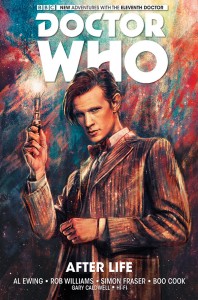
Edie Nugent: Did the fact that both of you worked together on 2000 AD help you in co-writing this series? If so, how?
Al Ewing: It probably did – systems evolved during the writing of Judge Dredd: Trifecta, our 2000 AD crossover, that helped with the writing of Who. For example, I’m pretty sure we had at least one Skype conversation during that time, although more often we met in the pub. And Trifecta involved some very intricate plotting, some of which happened on the fly, so it was good practice.
Rob Williams: It helped too that we knew each other and were friends. It’s not as if you’re co-writing with a stranger because who knows how that might go. But yes, as Al said, we’d co-written once together with Si Spurrier on Trifecta, so we knew how to do it, and felt confident we could make such a situation work.
Nugent: The writing on the After Life series is very consistent. How did you work together to find the “voice” of the Doctor and establish continuity of that voice through the series?
Williams: I think his voice is very well established by the series and by Matt Smith’s delivery. It’s easy to hear when writing dialogue for the book. If you feel you’re veering off track you just stick an episode of the show on for 10 minutes. Smith did the verbal patter very well.
Nugent: The audience knows Smith-era patter the moment they read it, but to have such an ear for writing new dialogue without it seeming forced: this just comes naturally to you?
Ewing: Well, writing any kind of unforced dialogue takes a lot of practice. But essentially, as long as the delivery seems correct, you can get away with a lot – Matt Smith can deliver a lot of different kinds of line and have them all seem part of the same character, so as long as the reader is hearing that voice in their head, it’ll cover a multitude of sins. I’m sure Rob and I both have writing tics that shine through once you’re looking for them. “…” for a pause is one of mine.
Williams: Without wanting to sound arrogant, I think Al and I are both pretty good with dialogue. The dialogue’s really not the hard part. Writing the Doctor he can babble on and you read it back and it’s all good stuff. But comics is a visual medium. So I find I have to cut a lot of my Doctor dialogue or the page would be overcrowded with speech balloons. The hard part with The Doctor is more the plotting, I find.
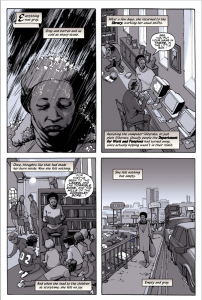
Williams: I think it was a case of trying to do something a bit different. The TV show usually has The Doctor with young girls as assistants. Smith looks so young, we thought it would be a fun dynamic to pair him with someone who seems to be physically older then him. Someone a bit more sure of herself having been through a life.
Ewing: I forget where she came from at first – it’s a long time ago – but I remember being very keen that she give as good as she get with regard to the Doctor. I’m pretty sure her age relative to other new series companions came up early on as well in connection with that – the idea that the actor playing Alice, if she existed as a TV series character, would be older than Matt Smith and have some natural authority there. Or maybe it was the other way around. I know her Dad dying in the Falklands set her age in stone to an extent, although I don’t know if we’ve gotten around to mentioning that at all.
Williams: It’s mentioned somewhere. I forget where.
Ewing: We know he died when she was small, and I think there’s a newspaper headline in one of the scenes about the end of the war, but I don’t know if we’ve connected the dots yet. It’ll be a nice tidbit for anyone reading this!
Nugent: There’s another thing that makes Alice so mature, aside from having more years under her belt than the average TV companion: she’s recently orphaned when the first issue opens. Very adult theme, that. Was there any push-back on opening the story line with such an emotionally dark moment: going through the motions and feeling empty following the loss of her mother?
Ewing: Not at all – I’m pretty sure everyone was up for that from the beginning. Originally, I think we were set to go much darker in terms of the overall plot – this is at the very early stages – but that ended up, rightly I think, being decided against. I think the balance between light and dark stuff we’ve got now is just about perfect.
Williams: Titan and the BBC were very supportive. I liked that opening very much. The subdued grey wasn’t what people were expecting. It’s a theme that continues through the entire series. The first ‘season’ of the comic is really Alice’s journey through her loss. Coming to terms with it, learning to move forward and live again. It’s the emotional spine of the book.
Nugent: So you worked together to co-write the series, even though issue 1 seems to be the only issue that’s co written (Al took issues 2,4 and 5 with Bob penning issue 3). Was it like television writing? Did you both form a ‘writers room’ of sorts at the pub or over Skype, blocking out the story arc and then individually write drafts?
Williams: We wrote half of #1 each. Al took #2, I did #3. Then Al did a two-parter with #4 & #5, I did #6. The entire 15 issue series is half Al, half me. #14 & #15 we’re writing half of each issue, so they’ll be co-written. The rest of the stories, there’s often little bits from one of us even if the other person is credited as scripting. My #10, for instance, Al made a suggestion there which helped nail down the theme. Lots of that going on. It’s a writer’s room dynamic throughout.
Ewing: That’s pretty much exactly how it went! For issue 1, we took eleven pages each and then did a lot of rewriting so they fit – after that, it’s been a matter of discussing where the plot’s going and where we want it to go on Skype, and then working out what’ll happen in each individual issue. (Or two-parter, if we’re writing both parts.) Mostly it happens on Skype – once or twice we’ve met up for a pint, but Skype’s probably more productive given the lack of booze.
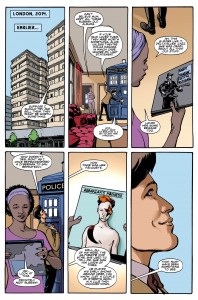
Ewing: Both of those are Rob’s doing, really – Jones was the companion Rob brought to the table, although I’ve had a lot of fun with him myself and rediscovered an interest in Bowie’s music.
Williams: That was just an idea born out off Bowie’s similarity to The Doctor in terms of regenerations. There’s always been a sense about Bowie of ‘where did this guy come from?’ Now, I’m sure certain substances were involved in that otherworldness. But what if, instead, he travelled with The Doctor? And that’s how he ended up with all these crazy outfits and looks etc. That seemed a fun idea. There’s a line in #3 which I think is true. If you had a time machine the first best use would be going to see all those classic gigs you’ve only ever read about.
Nugent: Al, Your issue 2 story centers on the idea of corporations ruining the ecology of a place, in this case Rokhandi and it’s natural beauty. The themes of industrial development and brainwashing could easily be transposed to the ecological worries of today. Were you intending to write the story as warning or wake-up call to the youth who will read it?
Ewing: I’m not sure I’d go as far as to call it a warning or a wake-up call – that sounds like I’ve got a bit more clout in the readers minds than I probably have – but Doctor Who stories should have some thematic links or resonances with what people are worried about in the real world. There was a lot of that during the McCoy era, as I recall – Doctor Who as a critique of Thatcherism. So yes, there’s more than a little in #2 that could be about corporate cronyism in politics or the selling-off of natural resources, but that’s all par for the course with Who.
Nugent: How are you both feeling about the recent news that your comic story line will merge with that of the tenth and twelfth Doctors this fall in a limited series to be written by Hugo-nominated Doctor Who television writer (and longtime Who fanboy) Paul Cornell?
Ewing: I’m looking forward to it! It should be a lot of fun, and I can’t wait to see what Paul does with our characters. I can’t think of anyone better to attempt a crossover of that nature, and I’ll be avidly reading every issue.
Williams: Paul’s a fine writer and a friend, so I’m sure he’ll do a stellar job and treat the Eleventh Doctor and Alice very well. I’ll look forward to reading it. And then we have ‘Season Two’ of the Eleventh to get up and running. We’ve already got a few fun, surprising things planned.
Nugent: Are there any more teasers you can give Comics Beat readers? Will we find out the identity of the mysterious Time lord that appeared to Eleven? Any other tasty tidbits?
Williams: You might find out the identity of the mysterious Time Lord in me and Al’s #14-#15 two-parter.
Ewing: Tasty tidbits…things are going to get very colourful in issue #11, and fans of a certain movie will be pleased with us.
Doctor Who: After Life Vol. 1 is available in stores on March 25.


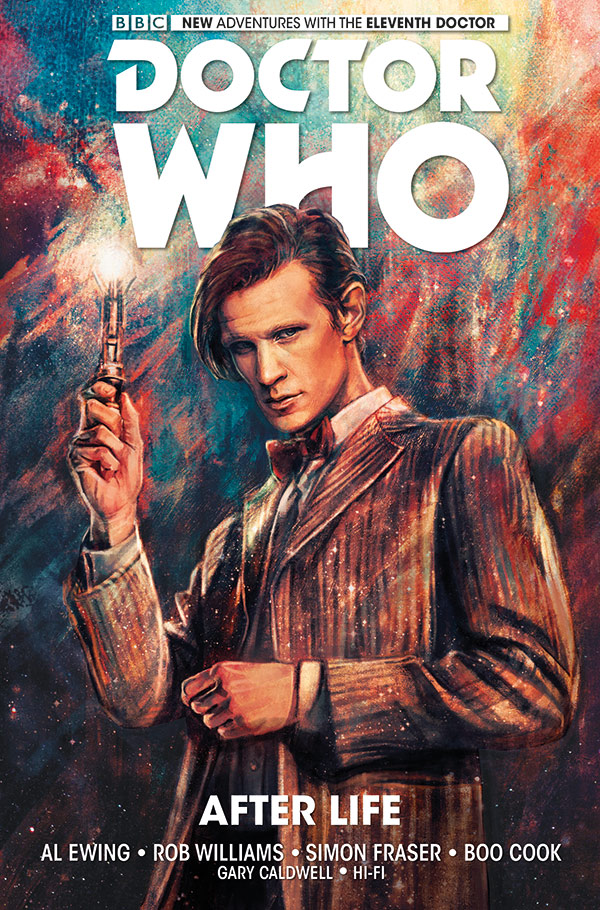
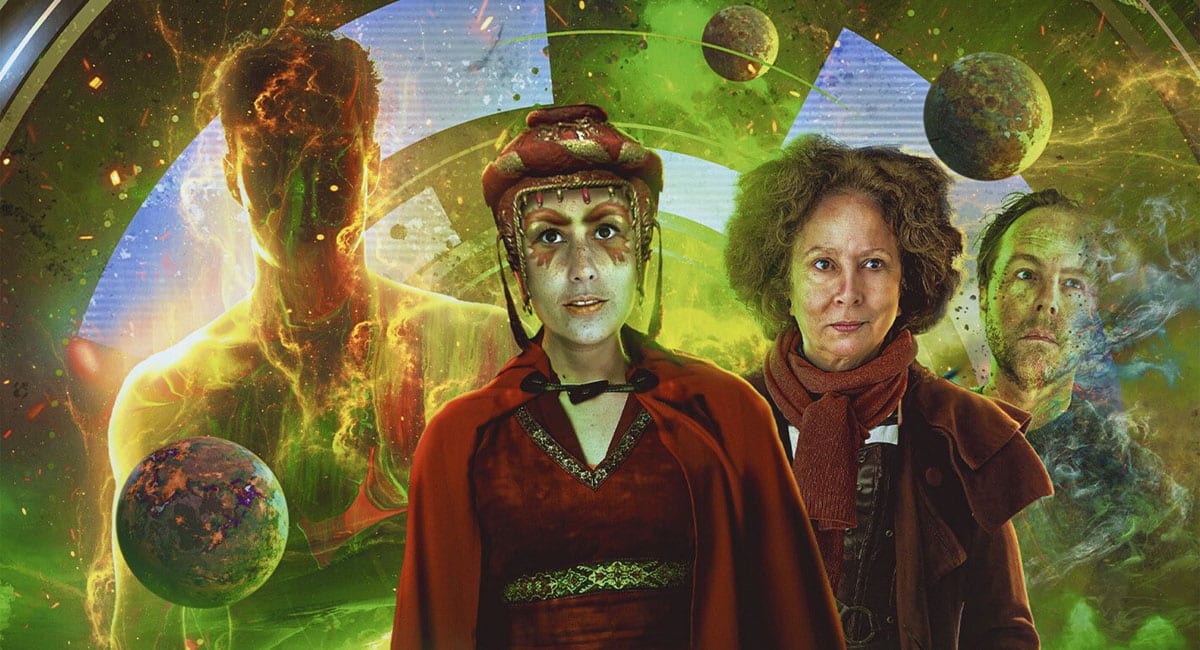




The Comic Book is fine yet when Mr . Capaldi(s) run is over , I suggest Three other actors that seem to have what it would take to do the role . Matthew McFayden , Ron Cook or Bill Nighy . If I see anyone else from some other shows I will post the perspective individuals .
@Prim_n’_Proper: Nighy would be a good fit, but (1) he’s a little too obvious and (2) there is no way the BBC can afford him. I’d love to see him on the show in some capacity, though, maybe as a Time Lord, maybe as a villain.
I’m not sure I recognize Matthew McFayden’s name. I’ve apparently seen Ron Cook in a couple things but don’t really remember him. Apparently he’s already been on Doctor Who in another role — but then again, so had Capaldi.
Yes, Ron Cook over MacFayden
Comments are closed.